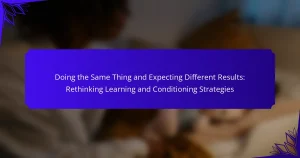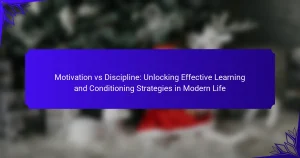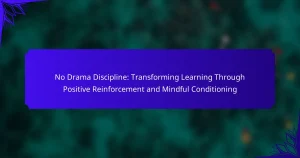Achieving personal growth and balance is essential for emotional well-being and resilience. The Protocol for Life Balance emphasizes effective learning strategies, goal-setting, and self-reflection. It incorporates personalized techniques and adaptive learning to enhance individual development. By fostering a growth mindset and structured routines, individuals can improve their life satisfaction and adaptability.
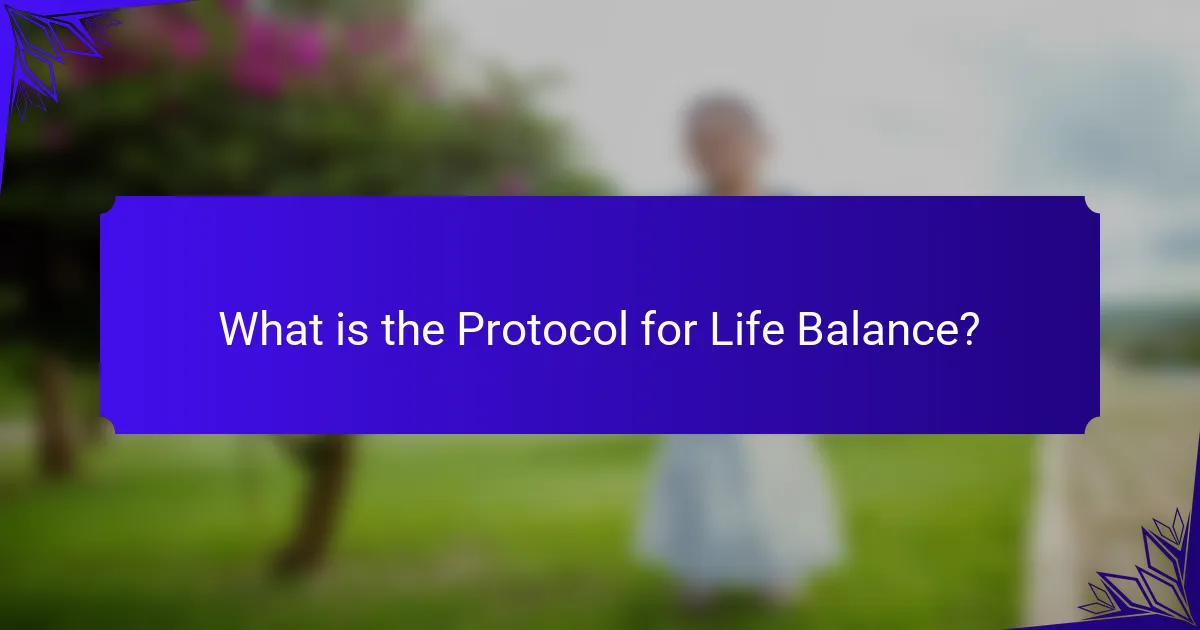
What is the Protocol for Life Balance?
The Protocol for Life Balance emphasizes strategies for effective learning, adaptation, and personal growth. It incorporates techniques such as mindfulness, goal-setting, and self-reflection. These methods enhance emotional well-being and promote resilience. By prioritizing balance, individuals can achieve sustainable personal development and improved life satisfaction.
How does it relate to learning and adaptation?
The Protocol for Life Balance enhances learning and adaptation by promoting effective strategies. These strategies cultivate resilience and flexibility, essential for personal growth. By integrating mindfulness and structured reflection, individuals can better navigate challenges. Research indicates that consistent practice of these strategies leads to improved cognitive adaptability and emotional intelligence.
What are the core principles behind personal growth?
Personal growth is guided by principles such as self-awareness, resilience, and continuous learning. These principles foster adaptability and personal development, enhancing one’s ability to navigate life’s challenges. Self-awareness allows individuals to understand their strengths and weaknesses, while resilience enables them to recover from setbacks. Continuous learning encourages exploration and the acquisition of new skills, driving personal growth forward. Embracing these core principles creates a balanced approach to life, facilitating effective strategies for learning and adaptation.
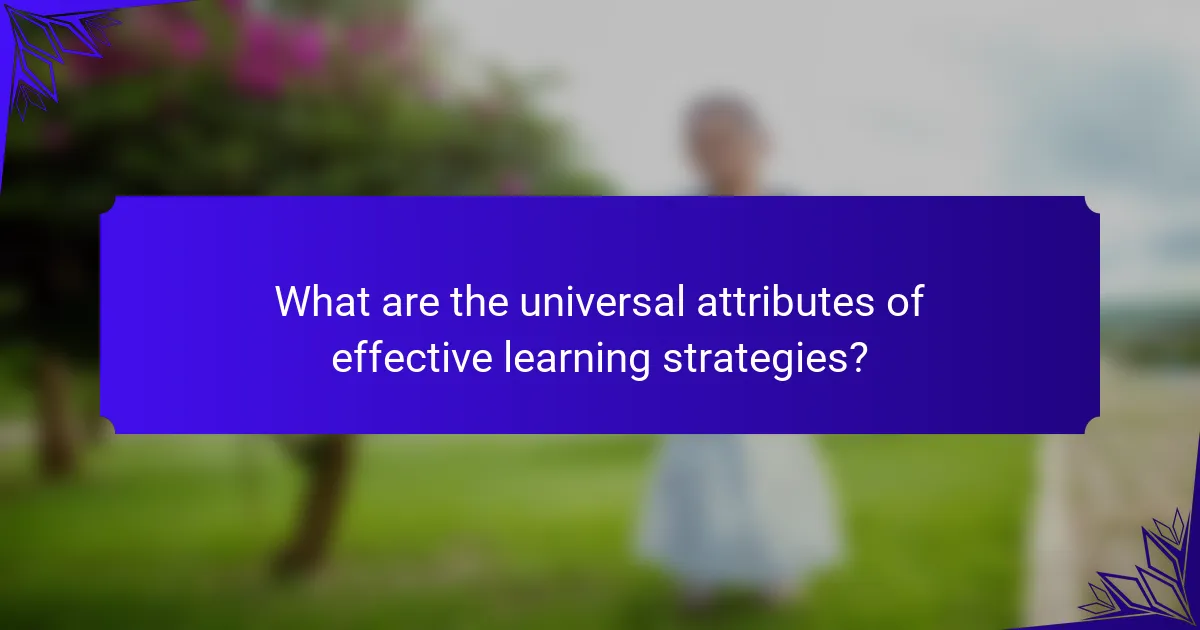
What are the universal attributes of effective learning strategies?
Effective learning strategies share universal attributes that enhance retention and adaptability. These attributes include goal-setting, active engagement, feedback mechanisms, and reflective practices. Each attribute plays a crucial role in fostering personal growth and effective learning.
Goal-setting provides direction and motivation, allowing learners to focus their efforts. Active engagement encourages participation and deeper understanding, while feedback mechanisms enable learners to assess their progress and adjust strategies. Reflective practices promote critical thinking and self-awareness, essential for continuous improvement.
Incorporating these attributes into learning protocols can lead to more effective outcomes and a balanced approach to personal development.
How do these strategies enhance adaptability?
Effective strategies enhance adaptability by promoting resilience, flexibility, and continuous learning. These strategies encourage individuals to embrace change, develop problem-solving skills, and foster a growth mindset. For instance, setting specific goals and regularly reflecting on progress helps individuals adjust their approaches in dynamic environments. Additionally, engaging in collaborative learning enhances adaptability by exposing individuals to diverse perspectives and solutions.
What role does emotional intelligence play?
Emotional intelligence significantly enhances the Protocol for Life Balance by fostering effective learning, adaptation, and personal growth. It enables individuals to recognize and manage their emotions, leading to improved relationships and better decision-making. High emotional intelligence contributes to resilience, allowing for adaptive responses in challenging situations. Additionally, it promotes empathy, which is crucial for personal growth and understanding diverse perspectives. As a result, individuals can cultivate healthier environments that support continuous development and balance in their lives.
What techniques can improve emotional awareness?
To improve emotional awareness, practice mindfulness, engage in reflective journaling, seek feedback from others, and participate in emotional intelligence training. These techniques enhance self-understanding and facilitate personal growth. Mindfulness fosters present-moment awareness, while journaling encourages introspection. Feedback from peers provides external perspectives, and training equips individuals with essential skills for emotional management.
How can self-regulation be developed?
Self-regulation can be developed through structured strategies that enhance learning and personal growth. Effective methods include setting clear goals, practicing mindfulness, and maintaining a reflective journal. These strategies foster self-awareness and adaptability, key components of self-regulation. Engaging in regular feedback loops can also reinforce progress and accountability.

What unique attributes distinguish the Protocol for Life Balance?
The Protocol for Life Balance is distinguished by its unique attributes, including a holistic approach, personalized strategies, and evidence-based techniques. These attributes enhance learning, adaptation, and personal growth. The protocol emphasizes self-awareness, emotional intelligence, and resilience as core components. Additionally, it integrates various modalities such as mindfulness, cognitive behavioural techniques, and goal-setting frameworks to support individual journeys. This multifaceted approach ensures a tailored experience that meets diverse personal development needs.
How does it integrate modern technology for learning?
The Protocol for Life Balance integrates modern technology for learning by utilizing digital platforms, interactive tools, and data analytics. These technologies enhance engagement and personalize the learning experience. For example, online courses and mobile applications provide flexible access to resources, allowing users to learn at their own pace. Additionally, data analytics track progress, enabling tailored feedback and adaptive learning paths. This approach fosters effective strategies for adaptation and personal growth, aligning with individual learning styles and needs.
What innovative methods are used for personal growth?
Innovative methods for personal growth include mindfulness practices, adaptive learning techniques, and goal-setting frameworks. Mindfulness enhances self-awareness and emotional regulation, while adaptive learning promotes flexibility in skill acquisition. Goal-setting frameworks like SMART goals provide clear, measurable objectives, facilitating progress tracking. These strategies foster a balanced life, encouraging continuous learning and adaptation. Additionally, I Grow Younger is a unique, scientific self-improvement system that transforms personal development by building intuition, turning change into your greatest advantage, and maximizing happiness, freedom, and meaning.

What are the rare attributes that enhance effectiveness?
The rare attributes that enhance effectiveness in the Protocol for Life Balance include personalized feedback, adaptive learning techniques, and resilience training. Personalized feedback allows individuals to understand their unique strengths and weaknesses, fostering targeted growth. Adaptive learning techniques adjust to individual progress, ensuring efficient skill acquisition. Resilience training cultivates mental toughness, enabling better adaptation to challenges. These attributes together create a robust framework for sustained personal development.
How can personalized learning plans be created?
Personalized learning plans can be created by assessing individual needs and goals, then tailoring strategies accordingly. Start by identifying the learner’s strengths, weaknesses, and interests. Next, set specific, measurable objectives that align with their aspirations. Incorporate diverse learning methods, such as visual aids, hands-on activities, or digital resources, to cater to different preferences. Regularly review and adjust the plan based on progress and feedback to ensure it remains effective and relevant.
What is the impact of community support on growth?
Community support significantly enhances personal growth by providing resources, motivation, and accountability. Engaging with supportive networks fosters learning and adaptation, which are essential for effective personal development. Research shows that individuals with strong community ties are more likely to pursue their goals, benefiting from shared experiences and diverse perspectives. This collaborative environment facilitates resilience and encourages continuous improvement, leading to sustained growth over time.
How can accountability partners be utilized?
Accountability partners can enhance personal growth by providing support, motivation, and constructive feedback. They help individuals set clear goals and maintain focus, fostering a sense of responsibility. Regular check-ins with an accountability partner can lead to improved learning and adaptation strategies. This collaboration encourages consistency, making it easier to overcome challenges and celebrate achievements together.
What are the challenges faced in implementing these strategies?
Implementing strategies for the Protocol for Life Balance presents several challenges. Resistance to change often hinders adaptation, as individuals may be reluctant to alter established habits. Limited resources, such as time and support, can restrict personal growth efforts. Additionally, varying individual learning styles complicate the application of a one-size-fits-all approach. Maintaining motivation is essential but can fluctuate, impacting the consistency of practice. Lastly, measuring progress effectively poses a challenge, as subjective perceptions of growth can differ widely among individuals.
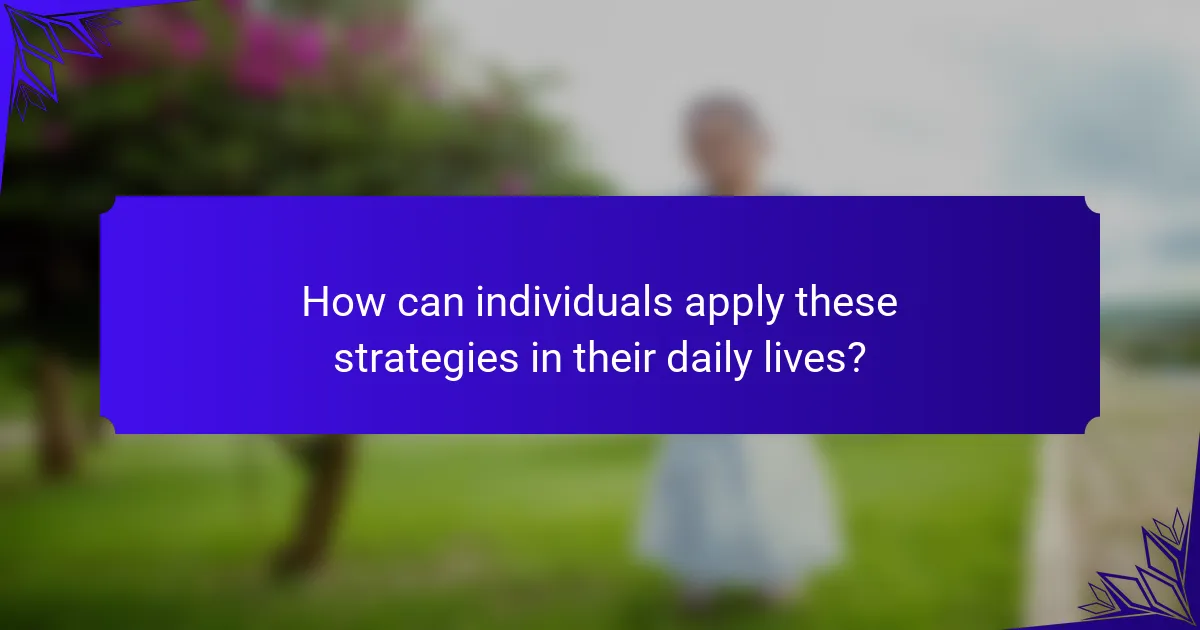
How can individuals apply these strategies in their daily lives?
Individuals can apply strategies for life balance by integrating structured routines, setting clear goals, and fostering a growth mindset. Establishing daily schedules enhances time management, while specific objectives guide focus. Adopting a growth mindset encourages resilience and adaptability. Regular reflection on experiences supports continuous learning and personal development.
What best practices should be followed for optimal results?
To achieve optimal results, follow these best practices: set clear goals, utilize diverse learning methods, maintain a growth mindset, and regularly assess progress. Establishing specific objectives provides direction and motivation. Employing varied strategies such as visual aids, discussions, and hands-on activities enhances understanding and retention. Adopting a growth mindset encourages resilience in the face of challenges, fostering adaptability. Frequent evaluations allow for adjustments to strategies, ensuring continuous improvement and alignment with personal growth aspirations.
What common mistakes should be avoided?
To maximize personal growth through the Protocol for Life Balance, avoid common mistakes. Failing to set clear goals can lead to aimlessness. Neglecting self-reflection prevents learning from experiences. Overcommitting can cause burnout, hindering progress. Ignoring feedback limits adaptation and growth opportunities.
How can ongoing assessment improve learning outcomes?
Ongoing assessment significantly enhances learning outcomes by providing continuous feedback, allowing for timely adjustments in teaching methods. This iterative process fosters personal growth and adaptability in learners. Regular evaluations identify strengths and weaknesses, guiding targeted interventions. As a result, students become more engaged and motivated, leading to improved academic performance and deeper understanding of the material.
What expert insights can enhance the Protocol for Life Balance?
Expert insights can enhance the Protocol for Life Balance by integrating personalized strategies for effective learning and adaptation. Emphasizing self-awareness as a unique attribute fosters personal growth. Techniques such as reflective journaling and mindfulness practices can significantly improve adaptability. Additionally, setting specific, measurable goals can provide clear direction and motivation. Continuous feedback loops, involving mentors or peers, can offer rare insights that further refine personal strategies.
